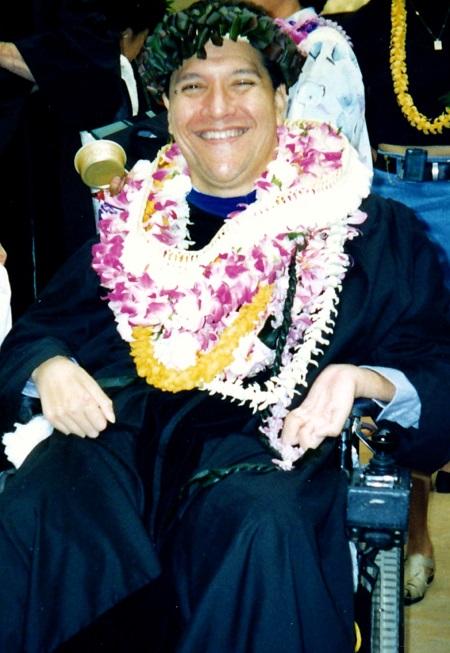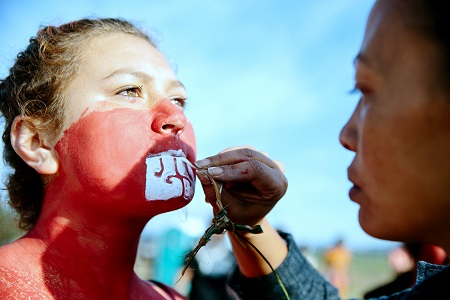
The life of the late Terry “Kanalu” Young, a UH Manoa Hawaiian Studies professor and indigenous rights activist, is profiled in the film “Kū Kanaka/Stand Tall,” one of the two features included in this year’s Deep Waters Film Festival, which took place at ASCC on October 19th, 2017. (Courtesy Photo)

In this scene from the film “Ever The Land,” indigenous Maori in Aotearoa New Zealand express their cultural heritage. “Ever The Land” is one of two features included in this year’s Deep Waters Film Festival, which took place at ASCC on October 19th, 2017. (Courtesy Photo)

The life of the late Terry “Kanalu” Young, a UH Manoa Hawaiian Studies professor and indigenous rights activist, is profiled in the film “Kū Kanaka/Stand Tall,” one of the two features included in this year’s Deep Waters Film Festival, which took place at ASCC on October 19th, 2017. (Courtesy Photo)
ASCC Hosts PIC Deep Waters Film Festival
October 19, 2017
By James Kneubuhl, ASCC Press Officer
Pacific Islanders in Communications (PIC), a nationally-funded organization based in Honolulu, strives to promote filmmaking as a storytelling medium among the indigenous populations of Hawaii and the US Pacific Territories. For the past several decades, PIC has presented a yearly showcase at the American Samoa Community College (ASCC) that features recent films produced under its aegis. This ongoing showcase series has become known as the Deep Waters Film Festival, and this semester it took place on Thursday, October 19th in the ASCC Lecture Hall.
This year’s Deep Waters showcased two recent documentaries, “Ever The Land” and “Kū Kanaka/Stand Tall”, with introductions by PIC board of directors member Regina Meredith-Fitiao of the ASCC Fine Arts Department. Set in Aotearoa New Zealand, “Ever The Land” explores the bond between people and their land through a landmark undertaking of design and construction by one of the country's most passionately independent Māori tribes, Ngāi Tūhoe. The second feature, “Kū Kanaka/Stand Tall,” examines the life of a former Hawaiian Studies instructor, Terry “Kanalu” Young, who many students from American Samoa may have personally encountered if they attended UH Manoa in the late ‘90s or early 2000s.
Set in the forest region of Aotearoa New Zealand’s Te Urewera, “Ever The Land” reveals the Tūhoe as an indigenous people fighting to rebuild and to claim their rights. For the past 150 years, the relationship between the Tūhoe Maori tribe and the New Zealand government has been defined by longstanding grievances over severe colonization experiences such as illegal land confiscations and the devastating consequences of scorched-earth policies. “Ever The Land” captures a period of change and tremendous foresight as the Tūhoe negotiate an apology and settlement from the Crown, and constructing an architectural gem of a community centre using radically sustainable methods. Tradition and environmentalism are brought together, and the film offers a stirring depiction of Indigenous pride.
“Kū Kanaka/Stand Tall” traces the life of Terry “Kanalu” Young, a professor, activist, and chanter who inspired Native Hawaiians to reclaim their sense of worth by the daily practice of Hawaiian language and culture. A childhood accident left Kanalu paralyzed from the neck down, with only limited use of his hands and arms. He nonetheless finished high school and college, competed as a wheelchair athlete, got arrested for the cause of Hawaiian sovereignty, graduated as a PhD in history, and was recognized as a pioneer professor in the emerging field of Hawaiian Studies.
Kanalu (which means “the wave” in Hawaiian) learned from being disabled to value the life he lived rather than mourn the life he lost. He used that insight to offer hope to dispossessed Native Hawaiians. At the same time, he lived by the indigenous Hawaiian practice of kuleana, recognizing his responsibility to ask for help rather than go it alone as a rugged American individualist. In classrooms, on cable television and even from his hospital room, Kanalu inspired thousands. Even with his body eventually giving out, he continued to challenge his people to help each other as a way to revive Hawaiian culture and repair their sense of self-belief.
“Both of these features offer compelling stories of indigenous Pacific islanders struggling to maintain their culture and identity in today’s complex world,” reflected PIC Executive Director Leanne Ferrer. “They’re also prime examples of how the medium of filmmaking not only documents our past but can also help shape our future. I encourage anyone interested in not just these features but filmmaking in general to view these works and learn more about PIC.” Information on PIC and its activities can be found online at www.piccom.org.
